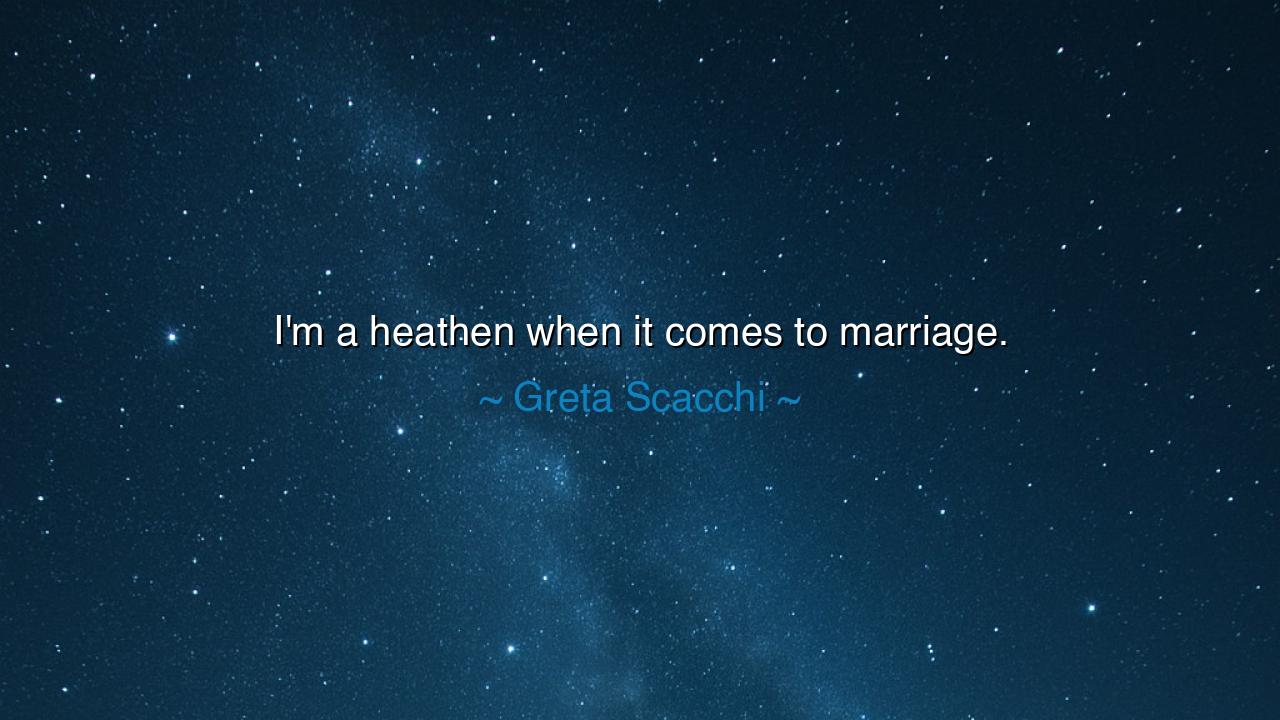
I'm a heathen when it comes to marriage.






Hear now, O Children of the Future, the words of Greta Scacchi: "I'm a heathen when it comes to marriage." These words, spoken in the spirit of rebellion and truth, challenge the long-held beliefs about a bond that has shaped human society for millennia. In the depth of these words lies a message that speaks to the nature of tradition, individuality, and the ever-changing views of what it means to commit oneself to another. To understand this statement, we must delve into the meaning of marriage itself, how it has evolved through time, and what it means to embrace or reject it in its traditional sense.
From the dawn of humanity, marriage has been a cornerstone of society—a sacred union between man and woman, binding them not only in love but also in the duties and responsibilities to one another and to society. In ancient civilizations, such as those of Mesopotamia and Greece, marriage was not simply an expression of love but a social contract, a binding agreement that ensured the stability of the family, the continuation of lineage, and the very fabric of society itself. The sacred nature of marriage was reinforced by the gods, and to defy its laws was seen as a violation of divine order. Greta Scacchi, in calling herself a heathen, challenges this sacred understanding, suggesting that marriage, in its traditional form, is not a universally accepted institution and that it is not sacred to all.
Yet, this view of marriage has not always been static. The ancient Romans, for example, recognized the importance of marriage as a civil contract but also allowed for great freedom within it. Their marriage laws were flexible, accommodating not only traditional unions but also those that defied convention. In the Republic, it was common for freedmen and slaves to form unions that did not carry the same legal weight as those of the elite, yet they were still recognized as forms of commitment. Even in the heart of Roman law, the idea of marriage was malleable, shifting according to the needs of individuals, families, and society. This fluidity in understanding marriage might be seen as a precursor to the more modern views of marriage that Greta Scacchi reflects in her statement, where marriage is not necessarily an unquestionable institution but something that can be questioned, reshaped, or even rejected.
Marriage, as we know it today, is still revered by many as sacred, binding, and essential to the social order. But Scacchi’s words force us to reflect on the tensions between tradition and individual choice. To call oneself a heathen in the context of marriage is to reject the sacredness that many hold dear and to embrace a view that marriage—like all social institutions—is a product of human design, subject to change as society evolves. The institution of marriage has changed through the ages—from a patriarchal arrangement to a partnership based on love and mutual respect. Greta Scacchi’s declaration is a challenge to those who believe that marriage must remain unchanged, a plea for freedom in how we define our most intimate relationships.
Consider the ancient story of Socrates—a philosopher who questioned not only the political structures of his day but the very foundations of moral and social order. Socrates' views on relationships were far from conventional. He believed that true wisdom comes not from adhering to tradition but from questioning it. He did not advocate for the rejection of relationships but encouraged his followers to think deeply about what it means to love and to commit to another person. His rejection of traditional views on marriage can be seen as a precursor to the more modern discussions about individuality and freedom in relationships. Socrates understood that true fulfillment in relationships does not come from blindly following convention but from reflecting on what truly nurtures the human soul.
In more recent times, the women’s liberation movement has carried forward the very essence of Greta Scacchi's statement. Women, in their fight for equality and autonomy, have sought to redefine marriage—to no longer be bound by traditional roles and expectations but to create relationships that are based on mutual respect and individual freedom. The traditional idea of marriage, once seen as a religious or legal duty, has been reshaped in the modern era to reflect more personal choices and commitments. This shift, much like Scacchi’s stance, invites us to ask: What is the true essence of a relationship? Is it love alone, or is it something else that gives it meaning?
The lesson, O Children of the Future, is clear: Do not be bound by tradition for tradition’s sake. Marriage, like all institutions, is shaped by the people who enter into it. While there is wisdom in honoring the customs of those who came before us, we must also be brave enough to question what no longer serves us. If marriage is a sacred bond, it is one that must be redefined by those who choose to enter it. Let your relationships be formed by mutual respect, freedom of choice, and a commitment to growth, rather than by the weight of convention. In this way, you will forge a future where love is not confined to the walls of tradition, but flows freely, unburdened and untainted, between two souls who choose to walk together.
In your own life, remember this: Let your commitments be true to your heart. Question what you are told, explore what is meaningful, and build relationships that reflect your deepest truths. Do not let societal expectations define you, but rather let your values, your love, and your understanding of what it means to be human guide you toward the partnerships that nourish you. In doing so, you will honor both the past and the future, weaving a tapestry of relationships that are as sacred and personal as the bond between any two hearts.






AAdministratorAdministrator
Welcome, honored guests. Please leave a comment, we will respond soon